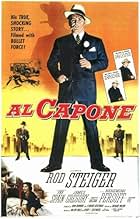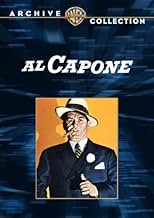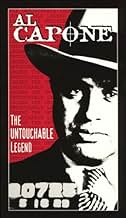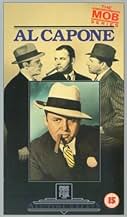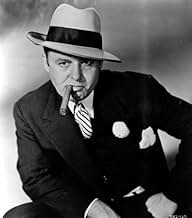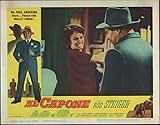IMDb RATING
6.7/10
2.1K
YOUR RATING
A chronicle of the rise and fall of Chicago crime boss Al Capone during the Prohibition era.A chronicle of the rise and fall of Chicago crime boss Al Capone during the Prohibition era.A chronicle of the rise and fall of Chicago crime boss Al Capone during the Prohibition era.
- Awards
- 1 win & 1 nomination total
Raikin Ben-Ari
- Ben Hoffman
- (as Ben Ari)
Fred Aldrich
- Funeral Spectator
- (uncredited)
Cindy Ames
- Nurse
- (uncredited)
- Director
- Writers
- All cast & crew
- Production, box office & more at IMDbPro
Featured reviews
Many actors have portrayed Capone over the years. It's virtually a "cottage industry," guaranteeing that yet another Capone flick will hit the screens before the collective audience has quite recovered from its yawn at the last one. And yet, for me, no one has ever come quite so close to nailing the role as Rod Steiger in this 1959 black-and-white low-budget effort.
As a matter of fact, using the term "low-budget" does this film a disservice, calling to mind as it does the run-of-the-mill output of producer/distributor Allied Artists (usually on the scale of "Attack Of The 50-Foot Mummified Woman Meets Godzilla's Teenage Werewolf Son"). For this film, however, the studio assembled a strong acting ensemble which includes Martin Balsam, Nehemiah Persoff, Murvyn Vye, and James Gregory, all of whom deliver standout performances.
Yet it's Steiger whose performance holds this film together. His Capone is a monster whose mood swings defy the term "mercurial," yet his psychopathy seems somehow strangely -- disturbingly -- human. You can sense the demons deep within him, and how they drive him, but you're never allowed to glimpse them, not even momentarily, lest you lose sight of the fact that this man truly is a monster. Eerily compelling, even hypnotic (particularly as he woos -- and wins! -- the widow of a cop he's previously murdered), Steiger invests his characterization with the bravura of the opera which the real-life Capone professed to admire. Alternately wheedling and bullying, bellicose and scheming, he assumes a larger-than-life mythos which resonates all the more uncomfortably due to a sense of plausibility, the feeling that such men do continue to exist among us.
The storyline itself is more or less factual, save for Gregory's character (which isn't even really a composite of any particular real-life law enforcement personnel), as well as a decision to re-name Balsam's character rather than use the identity of the real-life Jake Lingle, upon whom the character is based. Certain incidents have been fictionalized as to the way they happened, but that's to be expected in the interest of dramatic effect.
Overall, the film achieves an almost documentary effect. Steiger's performance makes it a very chilling documentary, indeed.
As a matter of fact, using the term "low-budget" does this film a disservice, calling to mind as it does the run-of-the-mill output of producer/distributor Allied Artists (usually on the scale of "Attack Of The 50-Foot Mummified Woman Meets Godzilla's Teenage Werewolf Son"). For this film, however, the studio assembled a strong acting ensemble which includes Martin Balsam, Nehemiah Persoff, Murvyn Vye, and James Gregory, all of whom deliver standout performances.
Yet it's Steiger whose performance holds this film together. His Capone is a monster whose mood swings defy the term "mercurial," yet his psychopathy seems somehow strangely -- disturbingly -- human. You can sense the demons deep within him, and how they drive him, but you're never allowed to glimpse them, not even momentarily, lest you lose sight of the fact that this man truly is a monster. Eerily compelling, even hypnotic (particularly as he woos -- and wins! -- the widow of a cop he's previously murdered), Steiger invests his characterization with the bravura of the opera which the real-life Capone professed to admire. Alternately wheedling and bullying, bellicose and scheming, he assumes a larger-than-life mythos which resonates all the more uncomfortably due to a sense of plausibility, the feeling that such men do continue to exist among us.
The storyline itself is more or less factual, save for Gregory's character (which isn't even really a composite of any particular real-life law enforcement personnel), as well as a decision to re-name Balsam's character rather than use the identity of the real-life Jake Lingle, upon whom the character is based. Certain incidents have been fictionalized as to the way they happened, but that's to be expected in the interest of dramatic effect.
Overall, the film achieves an almost documentary effect. Steiger's performance makes it a very chilling documentary, indeed.
Rod Steiger is excellent as the famed Italian-American gangster Al Capone. When you see him speaking Italian and getting hurt feelings when someone disrespects him, it makes you wonder (if you haven't already) why Marlon Brando was cast as the titular role in The Godfather, when so many other actors would have done a better job. Rod is so great in this role, it dampens others who have subsequently played Capone. Why was it necessary to keep making biopics when Scarface (the original) and Al Capone were so well-acted?
In the supporting cast, you'll see Martin Balsam, James Gregory, and Nehemiah Persoff. There's a pretty big focus on Capone's Achille's heel: Fay Spain. He's an enormously powerful man who gets his way always, and yet he's completely vulnerable to Fay's affections. He brings her expensive presents and dresses her well, but when she still doesn't love him, he feels worthless and unappreciated. I didn't understand why he didn't just move on and get another mistress, but then again, people are often drawn to those who will hurt them.
If you like Rod Steiger, check out this lesser known drama. It's filmed in a very old, 1930s style to pay tribute to the gangster period. It probably wasn't a hit at the time because movies like Ben-Hur, Journey to the Center of the Earth, and North by Northwest were big spectacles in Technicolor and full of action. This is a black-and-white nostalgia piece that reminds viewers of Prohibition and the Great Depression. It's well-done, but it's definitely stylized.
In the supporting cast, you'll see Martin Balsam, James Gregory, and Nehemiah Persoff. There's a pretty big focus on Capone's Achille's heel: Fay Spain. He's an enormously powerful man who gets his way always, and yet he's completely vulnerable to Fay's affections. He brings her expensive presents and dresses her well, but when she still doesn't love him, he feels worthless and unappreciated. I didn't understand why he didn't just move on and get another mistress, but then again, people are often drawn to those who will hurt them.
If you like Rod Steiger, check out this lesser known drama. It's filmed in a very old, 1930s style to pay tribute to the gangster period. It probably wasn't a hit at the time because movies like Ben-Hur, Journey to the Center of the Earth, and North by Northwest were big spectacles in Technicolor and full of action. This is a black-and-white nostalgia piece that reminds viewers of Prohibition and the Great Depression. It's well-done, but it's definitely stylized.
This 1959 picture is yet another cinematic retelling of the life of mobster Al Capone, and is better than most I've seen. Rod Steiger as Big Al seems miscast at first but wins me over in the end. Steiger was a born ham, but a fine actor for all his Methodish mannerisms, and has moments in the movie in which he's almost hypnotically effective. Yes, it's a performance, I kept on telling myself, but so was Capone himself. Over the top, perhaps, but Capone was himself more than a little touched, and Steiger nails this aspect of Capone to perfection, and is more effective in capturing the big guy's capriciousness than Robinson or Muni before him. Steiger's Capone isn't merely a gangster, he's a man possessed.
Director Richard Wilson's keeps this fairly modestly budgeted film moving at a fast pace, and it's never boring. In supporting roles, Fay Spain, Martin Balasm, James Gregory and Nehemiah Persoff are all effective. The black and white of this film evokes the late fifties more than the roaring twenties, and the movie at times feels a little like an episode of The Untouchables, at other times like Some Like It Hot. The Jazz Age was itself hot as the Eisenhower era was drawing to a close. F. Scott Fitzgerald's novels were coming back into vogue. O'Neill revivals on and off-Broadway were becoming commonplace. Al Capone captures this nostalgic mood, but really makes me nostalgic for the fifties more than for the twenties, for a time when fairly recent history could still be viewed as larger than life, the stuff of serious art and contemplation, not just fashionable nostalgia. Al Capone the movie is more nostalgia than serious art, but it touches on important issues, concerning violence, friendship, the role of government and the press as they pertain to and often collude with the criminal element, that still resonate today.
Director Richard Wilson's keeps this fairly modestly budgeted film moving at a fast pace, and it's never boring. In supporting roles, Fay Spain, Martin Balasm, James Gregory and Nehemiah Persoff are all effective. The black and white of this film evokes the late fifties more than the roaring twenties, and the movie at times feels a little like an episode of The Untouchables, at other times like Some Like It Hot. The Jazz Age was itself hot as the Eisenhower era was drawing to a close. F. Scott Fitzgerald's novels were coming back into vogue. O'Neill revivals on and off-Broadway were becoming commonplace. Al Capone captures this nostalgic mood, but really makes me nostalgic for the fifties more than for the twenties, for a time when fairly recent history could still be viewed as larger than life, the stuff of serious art and contemplation, not just fashionable nostalgia. Al Capone the movie is more nostalgia than serious art, but it touches on important issues, concerning violence, friendship, the role of government and the press as they pertain to and often collude with the criminal element, that still resonate today.
It's 1919 Chicago. Al Capone (Rod Steiger) is new in town. Nationwide Prohibition begins in 1920. The violent thug rises to be a top gangster.
This is a brutal depiction of the crime figure. It does have his prominent face scar. I don't always remember it being that prominent although the man is nicknamed Scarface. Overall, the performance has a realistic brutality. It's a rather straight forward biopic. I'm not sure how much new is being done here. Rod Steiger seems to have a dash of Brando but he's not at that level of charisma. The power is present. Others have done it bigger. Nevertheless, it's a very worthy performance.
This is a brutal depiction of the crime figure. It does have his prominent face scar. I don't always remember it being that prominent although the man is nicknamed Scarface. Overall, the performance has a realistic brutality. It's a rather straight forward biopic. I'm not sure how much new is being done here. Rod Steiger seems to have a dash of Brando but he's not at that level of charisma. The power is present. Others have done it bigger. Nevertheless, it's a very worthy performance.
Al Capone does give us a clear picture of the rise and fall of the colorful gangster. He is played convincingly by Rod Steiger. The supporting cast does a fine job, especially Martin Balsam who plays a Capone associate. The film is, for the most part, realistic, but the violent scenes come close to being non-violent compared to today's standards. If you liked the old TV series The Untouchables, you will like Al Capone.
Did you know
- TriviaMartin Balsam's character, Mac Keeley, was based on a real-life Chicago Tribune reporter named Jake Lingle. Lingle, a "legman" who ran down gang-related stories for the paper, had close ties to Al Capone and other gangsters as well as the notoriously corrupt Chicago Police Department, and he was well-paid by both mobsters and a police commissioner as a "go-between." Lingle was gunned down on June 9, 1930, much as depicted in the movie, after "getting too big for his hat", as Capone put it, and demanding too much for his services (though a Capone rival likely paid for the hit). Apparently legal concerns prevented the producers of this film from using Lingle's name. However, just a few months after this film was released, the TV series The Untouchables (1959) told Lingle's story in its third episode and used his actual name.
- GoofsAl Capones had two scars on his left cheek according to actual (if rare - Capone disliked being photographed to show them as is correctly pointed out in the film) photos. The depiction in films like The St. Valentine's Day Massacre (1967) and Capone (1975) is closer to the truth.
- Quotes
Al Capone: Nobody leaves Al Capone, you understand that?
Maureen Flannery: Well I do!
Al Capone: Oh no, you don't!
Maureen Flannery: Would you do me a favor please? Would you kill me?
- ConnectionsEdited into The Mystery of Al Capone's Vaults (1986)
- How long is Al Capone?Powered by Alexa
Details
- Release date
- Country of origin
- Language
- Also known as
- The Al Capone Story
- Filming locations
- Production company
- See more company credits at IMDbPro
Box office
- Budget
- $550,000 (estimated)
- Runtime1 hour 44 minutes
- Color
- Aspect ratio
- 1.85 : 1
Contribute to this page
Suggest an edit or add missing content



